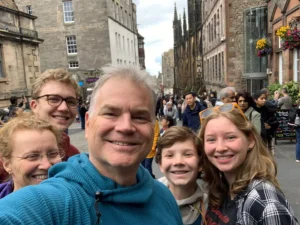
What happens when the philosophy of crime and punishment intersects with the complexities of human behavior and serious mental illness? Forensic psychiatrist Dr. Darren Lish navigates this intersection daily, working within the criminal justice system to assess individuals deemed not guilty by reason of insanity and overseeing competency restoration programs in jails across Colorado and California.
As an Associate Clinical Professor in the Department of Psychiatry at the University of Colorado School of Medicine, Dr. Lish is dedicated to improving the treatment and care of individuals with mental illness who find themselves caught in the legal system. His passion for advocacy and philanthropy fuels his support for organizations like AllHealth, where he believes meaningful change is being made for those who need it most.
What inspired you to pursue this work?
I knew from an early age that I wanted to become a physician, and by the time I was in college, I had developed a specific interest in neuroscience and the psychology of human behavior. I naturally gravitated toward the field of psychiatry in medical school, then became intrigued by the specialty of forensic psychiatry where the philosophy of crime and punishment intersects with our understanding of abnormal human behavior and the impact of serious mental illness upon decision-making and culpability. I continue to be endlessly fascinated by this work.
How has this work impacted your life?
Working within public psychiatry has shown me the consequences of deinstitutionalization and how our society has transferred the care of individuals with mental illness from hospitals to jails and prisons. This realization ignited my passion for advocating for community mental health treatment and an expansion of our state’s psychiatric hospital system. My work has reinforced how essential it is to direct resources toward supporting our most vulnerable populations.
What was your first job and your worst job?
My first job was as an attractions host at Disneyland, working on rides like Splash Mountain and the Haunted Mansion. It was a great high school job, especially in the summer when I got to be out on the Davey Crockett canoes. My worst job was digging ditches for underground plumbing on a construction site—exhausting work!
What is one of your top priorities right now?
One of my top priorities is advocating for the expansion of our state psychiatric hospital system. In the mid-1900s, Colorado had over 6,000 state psychiatric beds when the population was a quarter of what it is today. Now, we have only 600, with just 100 available for civil admissions. We need to invest in proper mental health treatment to prevent individuals from being caught in the criminal justice system.
What qualities do you look for in a friend?
I look for someone whom I can trust with my secrets, someone who will pick me up when I’m feeling down, and someone with whom I can share plenty of laughs.
Do you have a favorite saying or quote?
“This too shall pass.” I find it applicable in every situation.
What is the trait you like least about yourself?
I have always struggled with procrastination, especially when it comes to writing reports or academic papers. I wish I had the motivation to complete tasks well before they were due!
What or who is the greatest love of your life?
That’s an easy one: my wife Kira, who has been my best friend and partner for 25 years, and the mother of our three wonderful children.
If you were to die and come back as a person or a thing, what would it be?
I have always dreamt of being able to fly, so I think I would love to come back as an eagle.
What is your greatest regret?
My greatest regret was not walking onto the UCLA football team as a practice squad quarterback during my freshman year. I was offered the opportunity by Coach Terry Donahue, though I chickened out and told myself that I was too busy with my schoolwork and other pursuits. That year, both the starting and backup quarterbacks went down with injuries early in the season and every quarterback remaining on the team got an opportunity to start a game. The fifth-string quarterback who transferred from Santa Barbara ended up starting the final game in the Rose Bowl against our rivals, USC, and won the game. I was holding my head in my hands the whole time.
Dr. Lish’s dedication to forensic psychiatry and his advocacy for better mental health care make him an invaluable supporter of AllHealth. We are grateful for his generosity and commitment to creating meaningful change in our community.
Click here to join Dr. Lish in supporting AllHealth Network’s mission!
